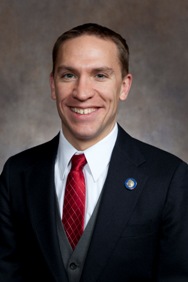
LARSON REPORT
WEEKLY NEWSLETTER
Click here to view this Email in your Web browser
August 29, 2013
CONTACT ME
Please feel free to contact me with any concerns or opinions you might
have.
Office Phone: (608) 266-7505
Toll-free Phone: (800) 361-5487
Email:
Sen.Larson@legis.wi.gov
Mailing Address:
State Capitol
P.O. Box 7882
Madison, WI 53707
Web Site:
Find Me on Facebook and Twitter:
COMMUNITY
EVENTS
Supporting our neighbors and being involved in our community is of the utmost importance. Some community events that might be of interest to you and your family are listed below.
Harley-Davidson
110th Anniversary Celebration
Date: Now through Sat., August 31
Location:
Milwaukee
Description: Help Harley-Davidson celebrate its 110th
anniversary. Festivities will take place around the Milwaukee area,
including the Summerfest grounds. Now through Saturday, August 31, there
will be countless activities including 60 different music artists
performing on five stages. There will be a wide variety of music
options, including ZZ Top, Common, Lupe Fiasco, and the Doobie Brothers.
CLICK HERE for more information.
Henry Maier Festival Park (MAP)
200 N. Harbor Drive
Milwaukee, WI 53202
Fish Fry & A Flick
Date: Fri.,
August 30 at 5 p.m.
Location: Milwaukee
Description: Enjoy a free outdoor movie on the Lakefront. This week's movie selection is The Avengers. Bartolotta will offer a Fish Fry, and Milwaukee's favorite food trucks will also offer food and beverage options nearby. CLICK HERE for more information
Discovery World (MAP)
500 N. Harbor Drive
Milwaukee, WI 53202
The Third Ward Art
Festival
Date: Sat., August 31 and Sun., September 1 from 10 a.m. to 6 p.m.
Location: Milwaukee
Description: The Third Ward Art Festival is located just three blocks south of downtown Milwaukee in the Historic Third Ward. The 2013 festival takes place as Harley Davidson brings hundreds of thousands of hog enthusiasts to Milwaukee for a national convention. Motorcycle themed artwork will certainly be available and coveted at this year's festival in addition to all other marvelous mediums. CLICK HERE for more information.
Milwaukee Comic Con
Date: Sun., September 1 from 10:30 a.m. to 4 p.m.
Location: Milwaukee
Description:
Mighty Con presents the Milwaukee Comic Con, a new comic convention and
collectibles show. Bring the whole family out to browse through
thousands of collectors' comic books, toys, statues, video games, and
more. See original artists and creators, talk about your favorite
collector hobbies, and enjoy the day at a price that everyone can
afford. Admission is just $3 for adults, kids 12 and under are free, and
every admission gets a free comic book.
CLICK HERE for more information.
American Serb Memorial Hall (MAP)
5101 W. Oklahoma Avenue
Milwaukee, WI 53219
Indian Summer Festival
Date: Fri.,
September 6 through Sun., September 8
Location: Milwaukee
Description:
Celebrate the 27th year of the largest Native festival of its kind in
the country. The festival features a Native fashion show, special
exhibit on Native languages from the Smithsonian's National Museum of
the American Indian, canoe rides, tribal farmers market, and a tradition
marketplace. Experience traditional food such as frye bread, buffalo
meat, venison, freshwater fish, and roasted corn. Return of Brule will
provide music while the festival also features cultural crafts such as
finger weaving, moccasin making, quill works, and pottery. Admission is
$12 for adults, $10 for elders 60 and over, and free for children 12
years or younger. Advanced tickets for $10 are available online.
CLICK HERE for more information.
Henry Maier Festival Park (MAP)
200 N. Harbor Drive
Milwaukee, WI 53202
Shooting Stars
Date:
Fridays beginning
September 6 through September 27 from 7 p.m. to 8 p.m.
Location: Milwaukee
Description: "Shooting Stars" will reveal the mystery behind the dazzling light streaks that shoot across the night sky. This show will explain what shooting stars or meteors really are and talk about the fireball that crashed into Russian soil last February. Guests will be able to learn how and when to see shooting stars. CLICK HERE for more information.
UWM Planetarium (MAP)
1900 East Kenwood Blvd.
Milwaukee, WI 53211
Department of Transportation Public Hearing
Date: Thurs., September 12 from 5 p.m. to 7 p.m.
Location: Oak Creek
Description: This hearing is on the environmental aspects of the conversion of US 41 to an Interstate Highway. This will be a chance for neighbors to view displays, listen to a presentation, and ask questions or provide testimony. CLICK HERE for more information.
Milwaukee Area Technical College-Oak Creek Campus (MAP)
6665 S. Howell Avenue
Lecture Hall Room A241
Oak Creek, WI 53154
Dear Friend,
Summer is coming to a close, which
means many of our family, friends, and neighbors are getting ready to go
back to school. This week's newsletter offers articles regarding state aid at
our K-12 schools, a higher education survey and tour, and Labor Day.
Continue reading for more information about these and other important
issues.
Sincerely,

Chris Larson
State Senator, District 7
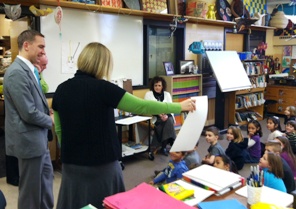 During
this time last year, legislative Democrats warned that schools would
face drastic funding cuts, fewer educational opportunities, and
reductions in teachers and staff. This was the result of legislative
Republicans passing Scott Walker's first budget as governor, which
decreased state aid support for Wisconsin's neighborhood schools by over
$800 million. Unfortunately, many schools are expected to fare even
worse this school year under Governor Walker's recently passed second
budget.
During
this time last year, legislative Democrats warned that schools would
face drastic funding cuts, fewer educational opportunities, and
reductions in teachers and staff. This was the result of legislative
Republicans passing Scott Walker's first budget as governor, which
decreased state aid support for Wisconsin's neighborhood schools by over
$800 million. Unfortunately, many schools are expected to fare even
worse this school year under Governor Walker's recently passed second
budget.
Cuts to General School Aid in Our Community
While general school aid statewide increased overall by 1.1%, including in the local Oak Creek-Franklin and South Milwaukee school districts, much of the increase is being diverted to private voucher schools as a result of Republicans expanding the program statewide. According to recent estimates by the Wisconsin Department of Public Instruction (DPI), more than half of Wisconsin public school districts will receive less general aid in the 2013-2014 school year than they did for the 2012-2013 school year. In fact, 229 of Wisconsin's 424 school districts, or 54%, will receive less general aid in the current school year. This includes our very own Cudahy, St. Francis, and Milwaukee school districts, which will see a decrease in state aid of $104,435; $199,455; and $1,407,778 respectively. In contrast, schools in the voucher program will see an astronomical increase of up to $1,414 per pupil.
Click here to view the break down of state aid for each school district.
Vouchers for Kids Already Attending Private Schools
Those of us residing in Milwaukee and Racine counties are already familiar with the damage our children, property taxes, and communities suffer as a result of expanding unaccountable voucher schools. Over the past 20 years, we have spent $1.5 billion on a voucher experiment that has failed the students of Milwaukee and Racine. In fact, study after study has confirmed that voucher school students fare no better and often worse than their public school counterparts. Unfortunately, rather than learning from the mistakes of Milwaukee and Racine's voucher programs, Republicans have instead decided to take the rest of the state down with this sinking ship.
Earlier this month, DPI announced the names of schools that would now be eligible to participate in the voucher program, which was recently expanded statewide. The schools took applications for 2,069 prospective voucher students for the upcoming school year and are located in the following districts:
-
Appleton
-
Beloit and Janesville
-
Chippewa Falls
-
Eau Claire and Altoona
-
Fond du Lac
-
Green Bay and De Pere
-
Kenosha
-
La Crosse and Onalaska
-
Madison
-
Manitowoc
-
Marshfield
-
Oshkosh
-
Plymouth
-
Sheboygan
-
Stevens Point and Plover
-
Wausau and Rothschild
-
Wisconsin Rapids
However, it has become clear that while these students may be new to the voucher program, the majority of them are not new to private schools. In fact, 1,393 students, or 67.3% of applicants, attended a Wisconsin private school in the previous school year. This means that the parents of two-thirds of eligible applicants were able to afford private school tuition or obtain funds without public assistance. The voucher program was created to provide parents of public school students with a "choice" they may not be able to afford on their own, but it looks like Republicans have quietly changed the program to instead offer taxpayer-funded handouts to the parents who can already afford to send their kids to private school.
Click here for more information about who is receiving voucher funds.
Additionally, as our public school students and their parents continue to be penalized by having to support two separate and unequal school districts, the parents of private school students will be further rewarded in this current budget with a tax break totaling $30 million in the 2014-2015 school year for an annual per student deduction of up to $10,000.
Study After Study Confirms Voucher Failure
Yet another study was recently released factually proving that voucher
students fare no better and often worse than their public school
counterparts. The study, released by the American Educational Research
Journal and the Educational Evaluation and Policy Analysis, has
conclusions that are nothing short of shocking. Below are the findings:
-
Students leaving voucher schools are the same children the program was designed to help. While the voucher program was created to give poorer, low-achieving students the opportunity for a better education, most of the children leaving voucher schools and returning to public schools are these poorer, low-achieving students. Such data reinforces that the voucher program is failing the very kids it was supposed to help.
-
Most students who transfer from the voucher program back into public schools realize significant achievement gains after doing so. Such achievement growth is even more significant for low-performing students. This statistic highlights that students who return to MPS truly do better once they are back in public school.
-
Voucher schools are less likely to identify and assist students who require special education. This means that children needing greater assistance are left behind.
-
Parental dissatisfaction was the most common reason cited by parents for students leaving the voucher program. Next in line was inadequate handling of special needs students. Such results verify that voucher schools do not always live up to the hype they have created and are frequently found to be a worse option for our children than traditional public schools.
Click here to access the voucher study mentioned.
In addition to this study, data recently collected by DPI shows a
snapshot of just how voucher school students are performing compared to
their public school counterparts. This data analyzes how all voucher and
public school students in 4th, 8th, and 10th grade performed in reading,
math, and science during the 2010-2011 school year. According to the
data, Milwaukee Public School students outperformed voucher students in
eight out of nine categories.
Much of the failings of schools participating in the voucher program can
likely be attributed to the lack of accountability and transparency
measures in place. Below are a few of the following standards that are
in place in our public schools but are not required by schools in the
voucher program:
-
Teacher Licensure--Require all teachers to be licensed by DPI
-
Background Checks--Require background checks on all staff and prohibit a school from employing an individual convicted of certain class felonies, such as sex offenses specified in Wis. Stats. 115.31
-
Open Records Law Compliance--Require that schools be subject to Wisconsin's Open Records Law
-
Special Education Staff--Require schools to employ special education teachers or therapists if pupils needing such services attend the school to prevent discrimination
-
Corporal Punishment Ban--Require schools to follow current laws governing corporal punishment
-
Uniform Graduation Credits and Standards--Require schools to conform with specific graduation requirements
-
Due Process Procedure for Expulsion--Require a due process procedure when determining expulsion at a school
Voucher Schools Raise Property
Taxes
In 2010, state law compelled Milwaukee Public Schools to levy over $50
million in taxes to subsidize the private and religious schools making
up the unaccountable voucher program, which amounts to 17% of the total
Milwaukee Public Schools tax levy. Due to policy changes in the last
Republican budget, the cost of the Milwaukee Parental Choice Program (MPCP)
rose significantly, exceeding the state's official 2012 estimate and
increasing the financial responsibility of taxpayers to 22.6% of the
total Milwaukee Public Schools tax levy.
In truth, Milwaukee taxpayers are now being billed for both the largest
school district in the state, Milwaukee Public Schools, AND the fourth
largest, which is what the Milwaukee Parental Choice Program has grown
to be with 22,400 students. The tax levy for the Milwaukee Parental
Choice Program already exceeds the Milwaukee Metropolitan Sewerage
District by nearly $10 million and is expected to exceed Milwaukee Area
Technical College's in the next few years. With the expansion of
vouchers statewide this is a burden that may now be endured by all
Wisconsin communities. While my Milwaukee colleagues and I were able to
successfully achieve some transparency by providing separate cost
information for MPS and MPCP schools on Milwaukee property tax bills,
such transparency does not exist in the other 423 school districts.
It is important to note that there are private schools in our community
that provide a great educational experience to families interested in
receiving a faith-based education. Unfortunately, it is impossible to
weed out the bad from the good without the necessary transparency
measures in place. As it stands, the voucher program remains
unaccountable. Our children and Wisconsin's property taxpayers cannot
afford to support the bad, unaccountable institutions that have failed
our children and taken advantage of the voucher program. If we continue
down this path, it is not only Wisconsin's future workers that will
suffer, but also our state. Our children's success or failure dictates
whether Wisconsin will succeed or fail.
Visiting a College Near You
With university and colleges resuming classes after Labor Day, my colleagues and I thought it would be the perfect time to visit various higher education institutions this September to discuss important issues facing Wisconsin's next generation of workers. This will include addressing the cost of higher education, access to affordable health care, and Wisconsin's prospects for economic recovery.
Students striving to better themselves through higher education are facing a number of obstacles in today's troubled economy. We simply want to ensure that current students, their parents, and educators have an opportunity to voice their comments and concerns to local legislators so we can work together on moving Wisconsin forward for all.
Details for upcoming events that are a part of the Making College Affordable Tour are provided below. I will also send out a follow-up email with the room numbers and times, once they are finalized. Do not hesitate to contact me with any questions regarding these events.
September 10
UW-Madison
*Room and time TBD
September 12 at 1:30 p.m.
UW-Milwaukee Student Union, Room 191
2200 E. Kenwood Blvd.
Milwaukee, WI 53211
September 16
UW-Marathon County
*Room and time TBD
September 18 at Noon
UW-La Crosse Cartwright Center, Ward Room
1725 State Street
La Crosse WI, 54601
September 23
UW-Green Bay
*Room and time TBD
September 24
UW-Eau Claire
*Room and time TBD
September 25
UW-Platteville
*Room and time TBD
Higher Education Survey Now Available!
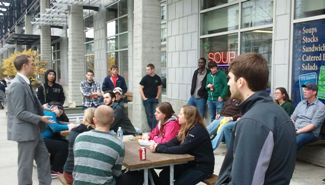
Share your thoughts on higher education affordability today by taking my short, online survey!
Over the years, exponential increases
in tuition and fees coupled with challenging economic times has made it
nearly impossible for students to work their way through school, as was
commonplace in the past. While 45% of 1992-93 bachelor's degree
graduates borrowed money from the government, private loan providers, or
family, according to a recent U.S. Department of Education survey,
approximately two-thirds of 2007-08 bachelor's degree graduates borrowed
money from the government or private lenders (family loans were not
considered in this figure). In fact, the U.S. recently surpassed $1
trillion in outstanding student loans, with the average debt in 2011
totaling $23,300.
As a result, higher education affordability has been a hot topic in our
state and nationally. Currently, the federal government has taken up
legislation to address the growing concerns surrounding this issue. I
would like to hear your thoughts on higher education affordability.
Therefore, I have created a survey to learn more about you and your
perspective. Please take the time to fill it out.
Click here to take the 2013 Higher Education Affordability Survey.
I look forward to hearing back from you on the important issue of higher
education affordability.
Celebrating Labor Day
As we celebrate Labor Day on Monday,
September 2, we should take time to remember Wisconsin's deep labor
history and the generations of workers and reformers who have made
significant contributions to building a strong middle class across our state.
Our Community Fights for Worker's Rights
 Our
community played a pivotal role in Wisconsin's labor movement, which
began over a century ago. Wisconsin's first unions were formed in
Milwaukee--the bricklayers in 1847 and the carpenters in 1848. In the
1880s, as the eight-hour work day became a central concern across the
country, laborers in Milwaukee formed the Milwaukee Labor Reform
Association (later the Eight-Hour League) to advocate for the eight-hour
day. Milwaukee workers fought for the eight-hour day with a five-day
sweeping industrial work stoppage, halting production in factories
throughout the city.
Our
community played a pivotal role in Wisconsin's labor movement, which
began over a century ago. Wisconsin's first unions were formed in
Milwaukee--the bricklayers in 1847 and the carpenters in 1848. In the
1880s, as the eight-hour work day became a central concern across the
country, laborers in Milwaukee formed the Milwaukee Labor Reform
Association (later the Eight-Hour League) to advocate for the eight-hour
day. Milwaukee workers fought for the eight-hour day with a five-day
sweeping industrial work stoppage, halting production in factories
throughout the city.
During the 20th century, Wisconsin's workforce continued to seek fair
treatment and safe working conditions for all under Robert La Follette's
progressive movement. In 1911, the State Legislature passed the first
workman's compensation law. Then in 1932, our first unemployment
compensation laws were enacted. Wisconsin continued to support its
workers by passing the Wisconsin Employment Relations Act in 1937, which
provided workers with the right to organize.
The labor movement was vital to growing a strong American economy and a
solid middle class. The ability to organize, receive fair treatment, and
work in safe conditions are fundamental values that built our state and
our country.
Celebrate Labor Day in Our
Community
Annually, we celebrate our hard-working Wisconsinites and the Labor Day
holiday with family-friendly neighborhood festivals. Join me in our
community this Labor Day weekend as we celebrate Wisconsin's current
workforce, as well as those that came before us and fought for better
workplace rights for all. See a list of local Labor Day events below:
Labor Fest
Monday, September 2
This family-orientated festival is the
largest Labor Day event in southeastern Wisconsin. Enjoy this free
event, which starts with a parade at 11 a.m. and then continues on to
the Summerfest grounds where a children's area, classic car show,
basketball contest, entertainment on two stages, adult bingo, and union
industry displays will be featured. There will also be and plenty of
food available for festival goers to purchase.
Henry Maier Festival Park (MAP)
200 N. Harbor Drive
Milwaukee, WI 53202
Click here for more information.
St. Francis Days
Thursday, August 29 through Sunday, September 1
This annual four-day music festival is free and open to the public. Visitors should expect to see live musical entertainment, a petting zoo, helicopter rides, movies, chicken and rib dinners, and a parade.
Milton Vretenar Municipal Park (MAP)
4230 S. Kirkwood Avenue
St. Francis, WI 53235
Click here for more information.
St. Martins Fair
Sunday, September 1 through Monday, September 2
Vendors at this fair sell an assortment of merchandise including clothing, shoes, hardware and household items, paper products, pet supplies, cleaning supplies, sporting equipment, gift items, dried flowers and arrangements, furniture, antiques, shrubs, flowers, fruits and vegetables, prepared food, and other miscellaneous merchandise. Special music groups also entertain the crowd throughout the Labor Day weekend event. This event takes place on St. Martins Road from the intersection of W. Forest Home Avenue to W. Church Street.
Click here for more information about this event.
August is National Eye Exam Month
Founded in 1989 by Sears Optical,
National Eye Exam Month marks August as the time to spread awareness of
the importance of eye health and safety. According to a survey taken by
Wellpoint Inc., one in five Americans delays scheduling an eye exam
because their to-do list is too long. Even if you have 20/20 vision, eye
exams are important because they do not only check your visual acuity,
but they are vital for spotting premature eye conditions and diseases.
In a complete eye exam, doctors check for eye diseases or conditions including cataracts, strabismus, glaucoma, diabetic retinopathy, and focusing and eye teaming problems. In some cases, your ophthalmologist can even detect early diabetes or high blood pressure through clues present in your eyes. Checking for these unexpected eye conditions is essential to your health and can help prevent them from worsening. In detail, your ophthalmologist will be checking for:
-
Strabismus: crossing of the eyes that lead to problems of depth perception and can be identified by checking the eyes' alignment
-
Glaucoma: a group of eye disorders that have no initial symptoms, but can lead to eventual harm of the optic nerve, which carries information from the eye to the brain
-
Diabetic Retinopathy: leading cause of blindness in the elderly (caused by diabetes) threatening the retina of the eye
Having frequent eye exams is
important. According to the National Institutes of Health, all children
should have vision screenings around the time when they learn the
alphabet, and then every one to two years afterward. However, screenings
should begin sooner if any eye problems are suspected. Adults are also
expected to get regular exams. Exams should occur every five to 10 years
for adults ages 20 to 39, every two to four years for adults ages 40 to
54, every one to three years for adults ages 55-64, and every one to two
years for adults ages 65 and older. Adults who wear contact lenses often
need yearly eye exams, while adults with certain eye symptoms or
disorders may require more frequent exams.
Want to know how to protect your eyes from damage? Here are some tips for taking better care of your eyes courtesy of the National Eye Institute:
-
Have a comprehensive, dilated eye exam
-
Know your family's health history being mindful of hereditary conditions that may affect you
-
Eat right to protect your sight by including fruits, vegetables, and omega-3 fatty acids in your diet
-
Maintain a healthy weight as being overweight or obese increases your risk of developing certain diseases, such as diabetes, that can cause vision loss
-
Wear protective eyewear when needed including safety goggles and sunglasses
-
Quit smoking or never start as it can increase your risk of developing age-related eye conditions that can lead to blindness
-
Give your eyes a rest as too much time in front of the computer or focusing on any one thing can increase eye fatigue and strain
-
Clean your hands and contact lenses properly to avoid the risk of infection
There are a number of organizations that offer free or reduced fee exams for Wisconsinites. The information for these programs can be found at the Wisconsin Department of Health Services Web site.
Click here to learn more about these programs.
Ask Chris
I often have neighbors contact me
looking for my perspective on various local and state issues. I very
much appreciate our neighbors' questions and want to dedicate a portion
of my newsletter to common questions that I hear to maintain an open
dialogue. Please continue reading for this week's question.
Q: I read an article recently about a "death tax" in Wisconsin. Could
you tell me more about that?
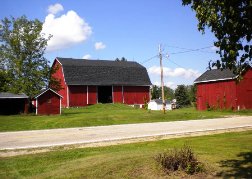 A:
The 2013-15 Republican budget brought about many damaging changes
for the citizens of Wisconsin. One harmful provision included in the
budget, that has only recently been brought to light, dramatically
expanded the state's ability to claim dead couples' joint property even
if the assets are protected in trusts. This measure, also known as a
"death tax," would allow the state to claim prized assets such as the
family farm. While it is unlikely the changes will take effect for
months, seniors who are hoping to leave property to their children and
families are already concerned about their ability to do so.
A:
The 2013-15 Republican budget brought about many damaging changes
for the citizens of Wisconsin. One harmful provision included in the
budget, that has only recently been brought to light, dramatically
expanded the state's ability to claim dead couples' joint property even
if the assets are protected in trusts. This measure, also known as a
"death tax," would allow the state to claim prized assets such as the
family farm. While it is unlikely the changes will take effect for
months, seniors who are hoping to leave property to their children and
families are already concerned about their ability to do so.
The language in this provision is intended to assist the state in recovering Medicaid money spent on long-term care programs, such as Family Care, which help keep individuals with disabilities and elderly people out of costly nursing homes. However, the provision goes far beyond typical boundaries with such a tax, as it would allow the Department of Health Services to claim property even if it is not subject to a probate--a legal process creditors can use to settle debt after a death--or held in a trust--a financial agreement in which a third party, such as a bank, holds assets until they are passed on to beneficiaries.
This new version of the death tax
punishes families who wish to transfer the family farm or business if
the head of the family is sick or disabled and needs certain Medicaid
services. No family should be faced with the worry of whether their
hard-earned property will safely be passed on to their children after
they have passed away. Such a concern flies in the face of the American
dream our forefather sought to create and uphold.
With school about to start, immunizations are front and center on the minds of parents, teachers, and children. Wisconsin requires 15 doses of five vaccines to enter kindergarten. Statewide, only 91% of students meet the vaccine requirements.
But did you know that immunization
prevents between 2-3 million deaths every year from diseases such as
diphtheria, tetanus, pertussis, and measles, making it one of the most
successful and cost-effective public health interventions?
Take a look at polio, for example. According to the World Health
Organization, polio cases worldwide have decreased by over 99% from an estimated
350,000 cases in 1988 to only 1,352 cases in 2010. The reduction is the
result of the global effort to eradicate the disease. In fact, only
three countries--Afghanistan, Nigeria, and Pakistan--remain
polio-endemic.
Click here for information on vaccination requirements for students
attending schools in Wisconsin.
Take the 2013-2014 Neighborhood Survey
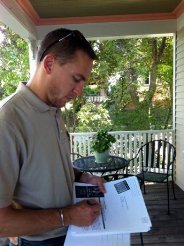 I created a survey for the 2013-2014
Legislative Session asking about various issues that are important to
our community and our state. The input of neighbors is greatly
appreciated. My staff and I will be working hard to deliver as many
surveys door to door as possible before winter arrives. In addition, I
have also made this survey available online.
I created a survey for the 2013-2014
Legislative Session asking about various issues that are important to
our community and our state. The input of neighbors is greatly
appreciated. My staff and I will be working hard to deliver as many
surveys door to door as possible before winter arrives. In addition, I
have also made this survey available online.
Click here to download and print a copy of this survey, which you can
return to my office via mail, email, or fax upon completion.
Click here to save a stamp and take the survey online.
I look forward to hearing your views on these important issues!
Summer Activities in Our Community
Our community offers a wide variety of summer activities for families, children, and adults alike. Below is just one of the many activities that you can take part in as summer wraps up.
Doggie Dip
With summer coming to a close, Milwaukee County's outdoor pools are concluding their season as well. However, to dog owners with water-loving pooches this means taking part in the annual Doggie Dip. Bring your dog over to Cool Waters in Greenfield Park between 6:30 p.m. and 8 p.m. on Monday, September 2 for a leisurely swim before the pools are drained for the season. Admission is $5 per dog with tickets available for pre-sale on Sunday, September 1 between 10 a.m. and 6 p.m.
Click here or call (414) 257-8089 for more information about this pet-friendly event.